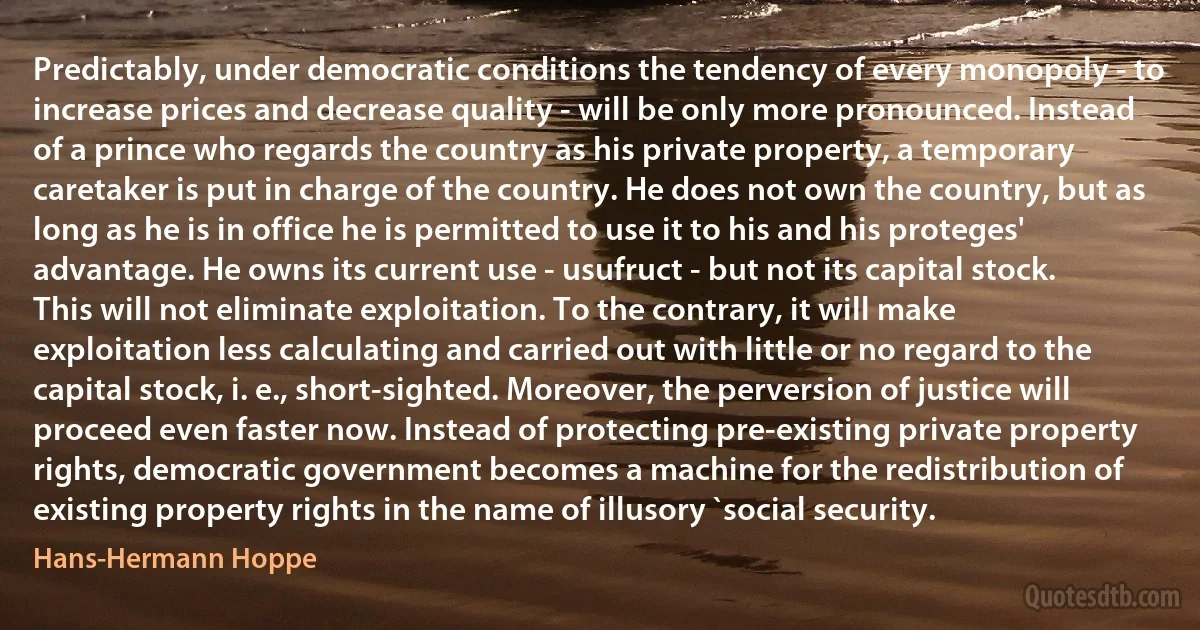
Predictably, under democratic conditions the tendency of every monopoly - to increase prices and decrease quality - will be only more pronounced. Instead of a prince who regards the country as his private property, a temporary caretaker is put in charge of the country. He does not own the country, but as long as he is in office he is permitted to use it to his and his proteges' advantage. He owns its current use - usufruct - but not its capital stock. This will not eliminate exploitation. To the contrary, it will make exploitation less calculating and carried out with little or no regard to the capital stock, i. e., short-sighted. Moreover, the perversion of justice will proceed even faster now. Instead of protecting pre-existing private property rights, democratic government becomes a machine for the redistribution of existing property rights in the name of illusory `social security.
Hans-Hermann HoppeRelated topics
advantage calculating carry charge country democratic government increase justice less monopoly name now office perversion prince proceed property quality security tendency under use caretaker redistributionRelated quotes
It is admitted that the power of taxing the people and their property is essential to the very existence of Government, and may be legitimately exercised on the objects to which it is applicable, to the utmost extent to which the Government may choose to carry it. The only security against the abuse of this power is found in the structure of the Government itself. In imposing a tax, the legislature acts upon its constituents. This is, in general, a sufficient security against erroneous and oppressive taxation. The people of a State, therefore, give to their Government a right of taxing themselves and their property, and as the exigencies of Government cannot be limited, they prescribe no limits to the exercise of this right, resting confidently on the interest of the legislator and on the influence of the constituent over their representative to guard them against its abuse.

John Marshall
The American people are right in demanding that New Nationalism, without which we cannot hope to deal with new problems. The New Nationalism puts the national need before sectional or personal advantage. It is impatient of the utter confusion that results from local legislatures attempting to treat national issues as local issues. It is still more impatient of the impotence which springs from over division of governmental powers, the impotence which makes it possible for local selfishness or for legal cunning, hired by wealthy special interests, to bring national activities to a deadlock. This New Nationalism regards the executive power as the steward of the public welfare. It demands of the judiciary that it shall be interested primarily in human welfare rather than in property, just as it demands that the representative body shall represent all the people rather than any one class or section of the people.

Theodore Roosevelt
What is the good, I ask, in the name of common sense, of prohibiting sweating in this country if you allow sweated goods to come in from foreign countries? If you insist on limitation, of hours and upon precautions for security, bear in mind all these things add to the cost of production, to the difficulties of the manufacturer in selling his goods, and unless you give him some increased price, some increased advantage in compensation, then he cannot carry on competition any longer. All these conditions in the long run will result not to your advantage, for you will have no work to do, but to the advantage of the foreigner, who is not so scrupulous and who conducts his work without any of these conditions...If protected labour is good, and I think in many ways it is...then it is good to protect the results of labour, and you cannot do one without the other.

Joseph Chamberlain
[The Kellog Pact is] a mighty moral bulwark against war - and we must never underestimate the effectiveness of moral bulwarks with no bayonet nor bludgeon behind them. The entry of the United States into the Permanent Court of International Justice, the growing confidence in the court, and the increase in the number of nations who have signed the Optional Clause mark definite and, I believe, irrevocable steps in the displacement of military power by judicial process in the settlement of international disputes. Public servants like us will fail in our duty if we do not diminish military power in proportion to the increase of political security...I dare affirm that, in the naval programme of the leading naval powers, there is a margin between real security needs and actual or projected strength, and the world expects this Conference to eliminate that margin.

Ramsay MacDonald
They were now as a party engaged in carrying laboriously uphill the last few columns out of the Gladstonian quarry. ... Foremost among the tasks of Liberalism in the near future was the regeneration of rural life and the emancipation of the land of this country from the paralysing grip of an effete and unprofitable system. ... [The reports into rural life] were startling. When they were published they would prove conclusively that there were hundreds of thousands, if not millions, of men, women, and children dependent upon the land in this country and engaged in cultivating it, hardworking men and women, who were living under conditions with regard to wages, to housing, as well as hours of labour-conditions which ought to make this great Empire hang its head in shame that such things could be permitted to happen in any corner of its vast dominions, let alone in this country, the centre and source of all its glory.

David Lloyd George
